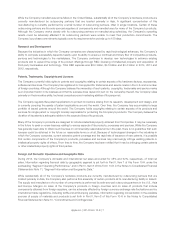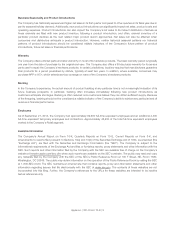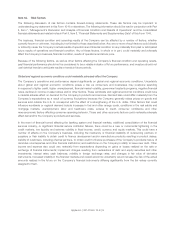Apple 2014 Annual Report Download - page 19
Download and view the complete annual report
Please find page 19 of the 2014 Apple annual report below. You can navigate through the pages in the report by either clicking on the pages listed below, or by using the keyword search tool below to find specific information within the annual report.The Company’s business is subject to a variety of U.S. and international laws, rules, policies and other obligations
regarding data protection.
The Company is subject to federal, state and international laws relating to the collection, use, retention, security and transfer of
PII. In many cases, these laws apply not only to third-party transactions, but also to transfers of information between the
Company and its subsidiaries, and among the Company, its subsidiaries and other parties with which the Company has
commercial relations. Several jurisdictions have passed laws in this area, and other jurisdictions are considering imposing
additional restrictions. These laws continue to develop and may be inconsistent from jurisdiction to jurisdiction. Complying with
emerging and changing international requirements may cause the Company to incur substantial costs or require the Company
to change its business practices. Noncompliance could result in penalties or significant legal liability.
The Company’s privacy policy, which includes related practices concerning the use and disclosure of data, is posted on its
website. Any failure by the Company, its suppliers or other parties with whom the Company does business to comply with its
posted privacy policy or with other federal, state or international privacy-related or data protection laws and regulations could
result in proceedings against the Company by governmental entities or others.
The Company is also subject to payment card association rules and obligations under its contracts with payment card
processors. Under these rules and obligations, if information is compromised, the Company could be liable to payment card
issuers for associated expenses and penalties. In addition, if the Company fails to follow payment card industry security
standards, even if no customer information is compromised, the Company could incur significant fines or experience a
significant increase in payment card transaction costs.
The Company’s success depends largely on the continued service and availability of key personnel.
Much of the Company’s future success depends on the continued availability and service of key personnel, including its Chief
Executive Officer, executive team and other highly skilled employees. Experienced personnel in the technology industry are in
high demand and competition for their talents is intense, especially in Silicon Valley, where most of the Company’s key
personnel are located.
The Company’s business may be impacted by political events, war, terrorism, public health issues, natural disasters and
other business interruptions.
War, terrorism, geopolitical uncertainties, public health issues and other business interruptions have caused and could cause
damage or disruption to international commerce and the global economy, and thus could have a material adverse effect on the
Company, its suppliers, logistics providers, manufacturing vendors and customers, including channel partners. The
Company’s business operations are subject to interruption by, among others, natural disasters, whether as a result of climate
change or otherwise, fire, power shortages, nuclear power plant accidents, terrorist attacks and other hostile acts, labor
disputes, public health issues and other events beyond its control. Such events could decrease demand for the Company’s
products, make it difficult or impossible for the Company to make and deliver products to its customers, including channel
partners, or to receive components from its suppliers, and create delays and inefficiencies in the Company’s supply chain.
Should major public health issues, including pandemics, arise, the Company could be adversely affected by more stringent
employee travel restrictions, additional limitations in freight services, governmental actions limiting the movement of products
between regions, delays in production ramps of new products and disruptions in the operations of the Company’s
manufacturing vendors and component suppliers. The majority of the Company’s R&D activities, its corporate headquarters,
information technology systems and other critical business operations, including certain component suppliers and
manufacturing vendors, are in locations that could be affected by natural disasters. In the event of a natural disaster, the
Company could incur significant losses, require substantial recovery time and experience significant expenditures in order to
resume operations.
Apple Inc. | 2014 Form 10-K | 17
























